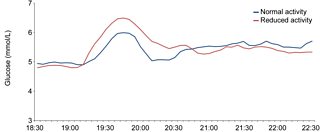What effect does physical activity have on your health?
We all know that exercise is meant to be good for us, and we’re often encouraged to be more active. But how exactly does activity affect our bodies?
Dr Matthew Cocks from Liverpool John Moores University helped set up an experiment in which 13 volunteers of varied age and fitness were asked to change their activity levels over a 4 week period while we monitored changes in their health.
The experiment
At the start, all 13 volunteers underwent a series of tests to measure their health – this included tests for heart rate, blood pressure, aerobic capacity, blood sugar levels, arterial fitness and more.
After these baseline tests, each volunteer was given a pedometer and asked to walk less than 3,000 steps each day for a 10 day period. This is at the lower end of the average activity level of the average person in the UK. After this “inactive period” we did all the health tests again. Finally, each person was asked to adopt a more active pattern for 10 days – they were asked to walk around 10,000 steps a day, and then we took all the same measurements for a third time.
10,000 steps a day is what the UK government (amongst others) advises we should aim for – it appears to be a figure that caught the public imagination as part of a fitness campaign in the run up to the 1964 Tokyo Olympics. It’s not scientifically calculated – so what effect did it have on our volunteers’ health?
The results
Changes were seen amongst all volunteers in two key areas – their cardiovascular health (how their heart, lungs and blood vessels work together to transport oxygen to their muscles) and their blood sugar levels.

After the inactive period (3000 steps per day) each volunteer suffered a drop in their cardiovascular health (as measured by VO2 max). This is often seen as an indicator of general health and even fitness, and everyone suffered a decline of at least 5% - with at least one person suffering a drop of 15% in just 10 days.
Across the group, there was a drop in their ability to regulate their blood sugar levels after the evening meal; blood sugar levels went higher and stayed higher for longer.
After the active period (10,000 steps per day) all volunteers saw improvements in both their cardiovascular health and their blood sugar levels - but they did not regain their baseline levels in the 10 days period.
What this means
The study suggests that inactivity could put people at risk because it causes a decline in their cardiovascular health and ability to control blood sugar levels. These adverse health effects were measured after just 10 days of inactivity. Poor cardiovascular health is associated with heart disease and strokes. Poor control over blood sugar levels is a risk factor for Type 2 diabetes, and even heart disease.
Although the levels dropped during the inactive period, they did rise again when participants followed the 10,000 step regime; however, they didn’t regain their starting points. Dr Cocks believes that with an additional 10 days of exercise they would have done so.
This suggests that even amongst healthy people, inactivity can lead to a decline in health. The study period for this experiment was very short – around the time people might go on a beach holiday – and we still saw measurable changes in health. However, the good news is that our volunteers’ bodies quickly responded to exercise, and improved even though it might take a bit longer to regain your health than it took to lose it!
This study was small and over a short period of time - it does agree with a lot of research that suggests that moderate exercise can have a very real and positive impact on your health – and we have shown that this can happen in a surprisingly short time.





















